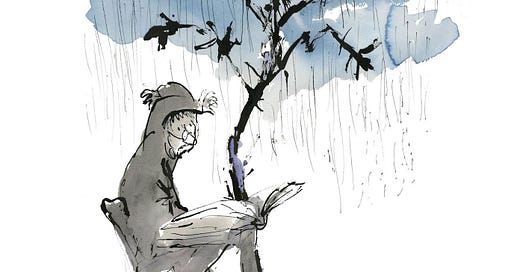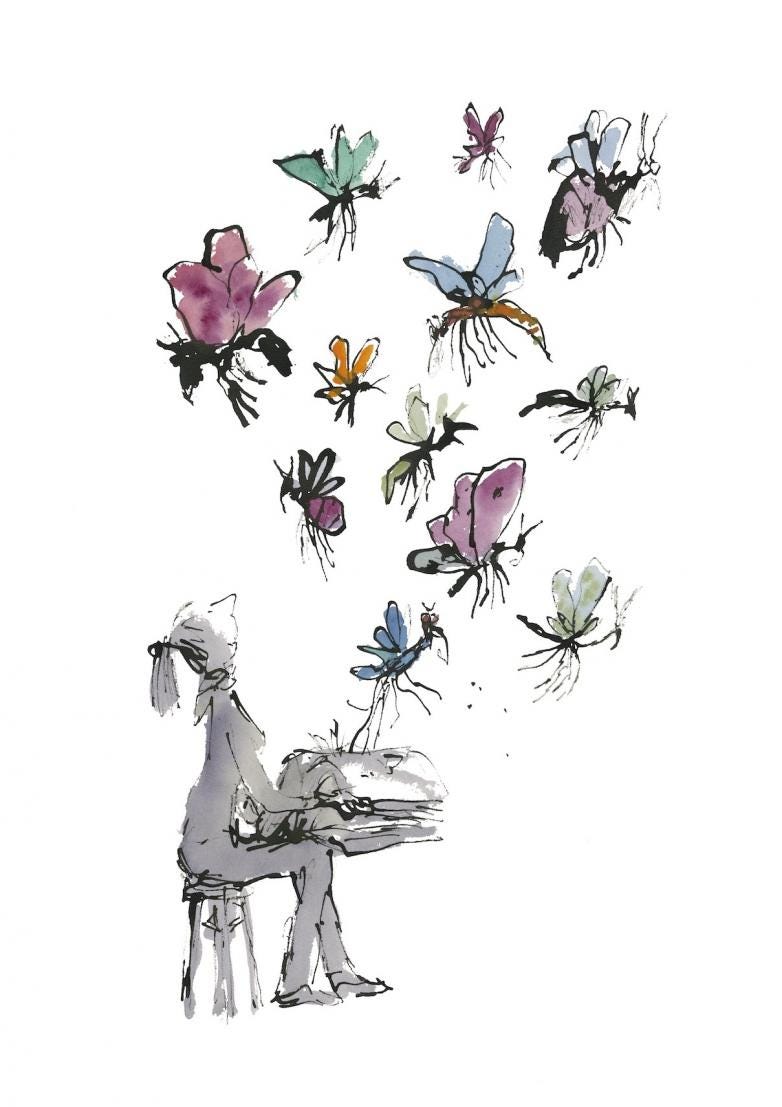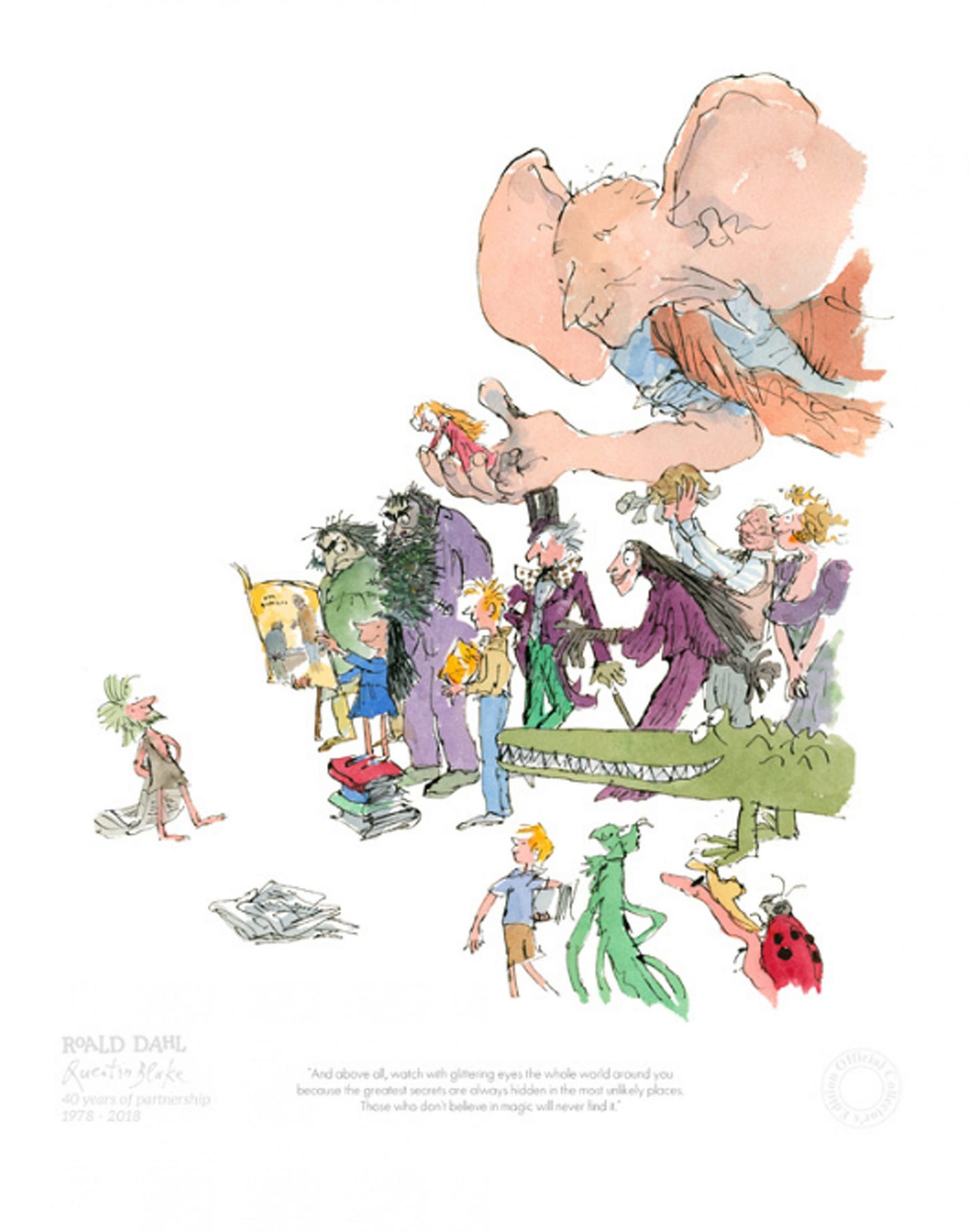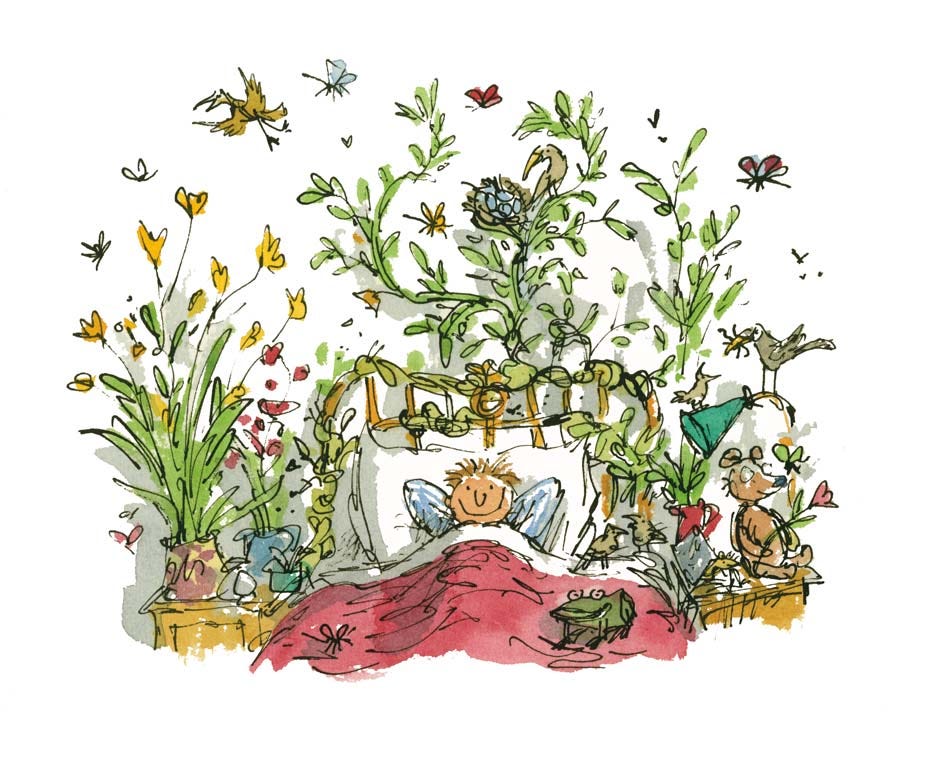Roald Dahl and the True Politics of Inoffensiveness
Or, how the Right capitalizes on the offenses of capitalism
Many of you have heard of the controversy around Puffin’s decision to rewrite Roald Dahl’s classic children’s books, stories like The Witches, The BFG, and James and the Giant Peach. The editors will be changing the books without the author’s permission, since he is long dead, in order to take out words deemed offensive like “ugly” and “fat”. Already an army of victimized right-wingers are howling that this is the latest travesty carried out by woke leftists.
Puffin, however, is not a leftist organization, nor are they anarchists, nor any other kind of anticapitalist. I’ve never seen their representatives at a social center or an assembly, and I’m pretty sure they didn’t ship mutual aid packages to resistance movements in Chiapas or Rojava, nor to encampments at Standing Rock or Atlanta. In fact, Puffin is a major corporation, a publishing monopolist. And of all the people I know who believe in emphasizing how language—in particular certain words—may reproduce systems of oppression or harm people in ableist or racist or sexist or other ways, I have never once heard them say we should edit past works of fiction. What literature children should be exposed to is an open question with a variety of viewpoints, but whitewashing the language of the past does not seem to be one of them.
Progressive novelist Philip Pullman went to the media to criticize what Puffin is doing and to suggest a different approach: let Roald Dahl’s books go out of print if parents don’t want their kids learning oppressive insults, and instead support the work of one of the many great authors writing children’s stories today.
I think this is a good approach, but at the same time we might consider the suggestion a little naïve. Because for Puffin, it’s not about making good literature available. It’s about the money. Why would a publishing corporation want to trust parents to find other writers? Dahl is an author who already has name recognition, and that’s 90% of marketing, which is one of the greater parts of overhead in the publishing industry. Roald Dahl’s name is capital. And so is his ouevre, now that Netflix has acquired rights to it. In a publishing industry facing ever tighter margins, executives salivate over the temporary bump in sales that result every time a work of literature is butchered and served up as a trite little movie or TV series.
Pullman’s suggestion, and the fact that it will be ineffectual, illustrates a certain dynamic. There are so many good writers out there, and very few of them will get published, and almost none of them will be elevated to the pedestal of mega-bestsellers. To add insult to injury, a significant portion of those who win the publication lottery, even some of those who make bestseller status, are mediocre writers. JK Rowling is an example of this phenomenon, but certainly not the only one.
Sure, there are plenty of undiscerning readers out there, but the fact that so many good writers never get any attention while hacks sell tens of millions of copies is not actually a result of reader choices, or not only a result of those choices. It is, overwhelmingly, the result of the architecture (to refer to last week’s newsletter) that governs the publishing industry nowadays, an architecture that is geared exclusively towards the extraction of profit and not at all towards the publication of good literature. The four or five corporations that control nearly all fiction publishing cast a wide net, attaining the publishing rights to as much literature as possible, 99% of which remains effectively locked up in a vault. The titles that are promoted by their massive marketing apparatus are the ones indicated by marketing research (carried out by people who are practically illiterate when it comes to recognizing good craft) and not by literary critics. From there, books get more or less marketing resources depending on algorithms related to sales and media attention. The whole machine is designed to elevate a very small number of titles, to dedicate immense resources to blowing up just a few writers, because this is most conducive to profit. It is not designed to get well written stories into people’s hands.
Interestingly, the same model and the same algorithms are in use across all the platforms and apps dedicated to what people without souls and without a love of language refer to as “content creation,” from Twitter to Onlyfans. The apparatus captures as many “creators” as possible but only shares profits with a tiny proportion who are elevated to superstar status.
Another depressing thing we can learn from this Roald Dahl story is how effective the Right is at blaming effects of capitalism on the Left, or on their incoherently imagined conspiracy that conflates everyone from Democrats to trans activists to abortion providers to anarchists with “the Left”. They accuse us of censoring out offensive language to present us as a threat to basic decency to justify their own very real censorship campaigns (with Ron DeSantis in Florida now prohibiting African American studies in state high schools and the teaching of Critical Race Theory or diversity-oriented programs in colleges). And in the meantime it’s the capitalists, instrumentalizing the rights of the (intellectual) property owner which the Right has always championed, who are actually responsible for the original act of censorship which they blew up into an existential threat.
Likewise, anticapitalists really care about history, and generally know much more history than anyone on the mainstream political spectrum. Yet when we take down statues and change street names, the Right accuse us of trying to erase history, confident that the media will never teach viewers to make the simple distinction between celebrating certain historical figures and remembering history. It is because we know our history and want everyone to know it too that we take down statues. But once the Right throw up their smokescreen, they invariably try to edit history textbooks to remove information about slavery and resistance…
This pattern of right-wing smokescreens is much broader than questions of language and the current campaign against so-called wokeness. With the industrial disaster poisoning the people and the land of East Palestine, the fact that capitalism constitutes a war against us, a war against life, is becoming so apparent. Again. Wasting no time, the Right is now mobilizing to convince folks in East Palestine that they were discriminated against for being white. The same Right that champions the kind of deregulation responsible for the toxic train wreck (a politics of deregulation that the Democratic Party has largely copied) is stepping in to prevent the kind of consciousness that might lead white people in rural Ohio to identify with the largely Black residents of Rust Belt cities suffering from years of lead poisoning.
The deeper issue is one of history, consciousness, and whether or not we can see our situation clearly enough to position ourselves strategically.
Actual radicals do not care about being offensive, or at least, we shouldn’t. To do what we need to do, we have to offend a great many people, and rock all the boats. We do care about power, and harm, and healing, though. It makes sense for radicals who are parenting to wait a while to introduce their kids to certain books if language in those books might teach their kids to be insulting and harmful to their peers or to hate themselves. Body shaming language can have that effect, without any doubt, as can racist and sexist insults. It can help to have a little historical perspective to understand that there are really good stories that also have difficult or hurtful aspects, because all stories reflect the cultures they were born into. And it is through engagement with that past and with that complexity that we figure out what kind of culture we want to foster.
After all, protecting kids from storybooks is not going to protect them from the oppressive dynamics that run rampant throughout our society, and anyone who has thought seriously about parenting or who remembers what it was like to be a kid knows this. (Once again, we cannot limit our scope to language. We have to think about power and harm, which does not exclude language, but it doesn’t stop there either.)
Unsurprisingly, the entire mainstream conversation is framed in a way that makes it almost impossible to grasp what is actually going on and what we should be doing about it.
So, let’s keep interrupting that conversation, rocking those boats, and in the meantime promote the stories that the industry is not. Puffin and the other major publishers will never do this for us, but we can do our best to subvert their profit-driven choices.
Here are a few indie fiction authors who could use some support!
The first are anarchist speculative fiction authors, The latter are children’s book authors/illustrators who share the kinds of stories that weren’t being shared in the past. Some of them are also movement participants. Get these books, read them, talk about them with friends, ask your local bookstores to order them, give them reviews, gift them to your children or the children of friends (in the case of the latter) or to older family members or colleagues who might not understand your radical politics but who have a weak spot for novels!
Alan Lea, Hermetica
Adi Callai, The Sodomites
Nicole Daniels, Junebug
Geneviève Castrée, A Bubble
All images by Quentin Blake.








Very interesting!
That last book review, 😥. Thank you. And thanks for the book suggestions (I was halfway through your essay and planning to ask for suggestions). We started reading some Roald Dahl to our girls a year or so ago, and didn’t read more because of the language but I do hope as they get a little older they will dive into his world which I loved (Henry Sugar was my favourite). We’ve since then had several entertaining conversations with them regarding bad language (Dada says stupid, mama says F**k) and when and when it’s not appropriate (never JC in front of Lola). This was prompted by my daughter telling me that the priest at mass one time when they got taken along said the bad word (JC)!